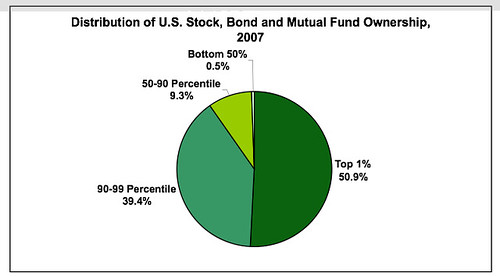Republicans are proposing a huge, huge cut in corporate tax rates. They are also proposing to let giant, multinational corporations keep much of the money they already owe on profits they have stashed in "offshore" tax havens.
Lower tax rates mean higher after-tax profits, which increases the value of stock holdings.
Who owns corporate stock, and therefore will receive the benefits of these tax cuts?
Do We All Benefit From Corporate Stock?
Lets look at just who owns corporate stock.
Republicans like to pretend that we are all invested in the stock market, if not by directly owning stocks, then through "our" retirement plans. This is usually repeated and believed by comfortable people who actually do have 401k or other individual retirement accounts (IRAs) through their workplace.
But 45 percent of Americans have no money for retirement at all. Only 44 percent of Americans put anything into a 401k, even if their company offers one -- and this number includes workers with only $100 in the plan.
Only 18 percent of Americans are putting money in an Individual Retirement Account (IRA), ehich may or may not hold stocks. Only 4 percent of private-sector workers have only a "defined benefit" plan, usually called a pension.
So much for "our" retirement plans. Aside from retirement plans, a 2016 Gallup survey found that only 52 percent of Americans own any stocks at all - down from 65 percent in 2007.
So Who Does Own Stock?
Here is a chart of who owns corporate stock (and therefore pays those taxes.)

As of 2007, the top 1 percent owned 50.9 percent of all stocks, bonds, and mutual fund assets. The top 10 percent owned 90.3 percent. Things have only concentrated upward since 2007.
How much have things concentrated upwards since then? 20 Americans now hold as much wealth as half of all Americans put together and "the 400 richest Americans now have more wealth than the bottom 61 percent of the population."
People talk about an "upper class" that holds most of the wealth in our society now. Maybe the thinking on this needs to change from a "class" of people to just a few people.
It is these few people who are the beneficiaries of corporate tax cuts. As tax rates drop the value of their stock holdings rises. The rest of us lose our ability to have good schools, roads, health care, courts, scientific research and all the rest of the things our government tries to do to make our lives better.
This is who we are talking about when we talk about corporate tax rates. It's not anonymous, nameless corporations, it is people - just a very few, very rich, people.

